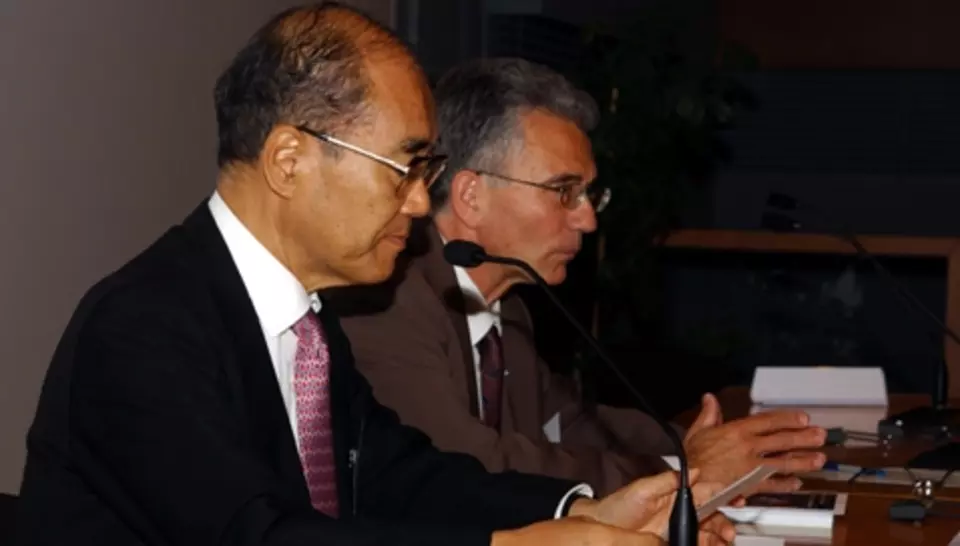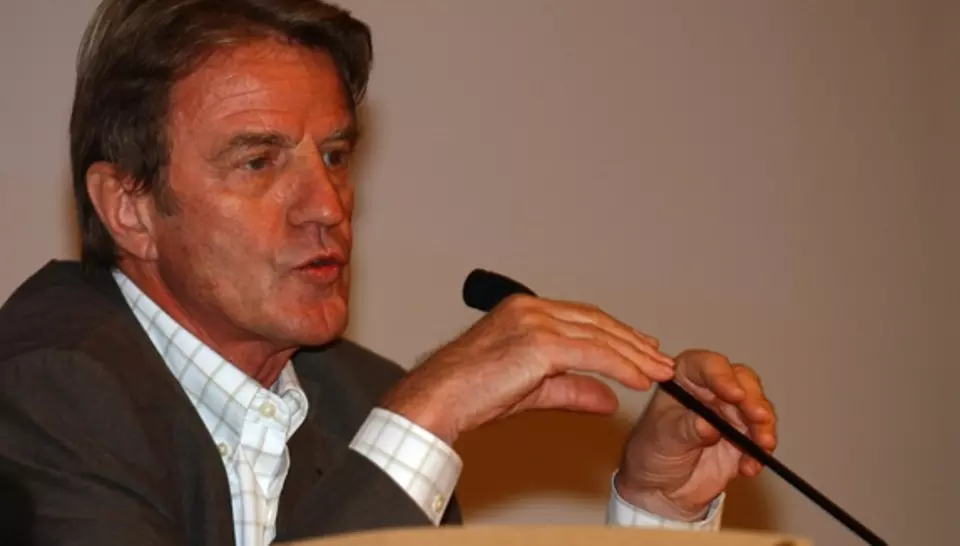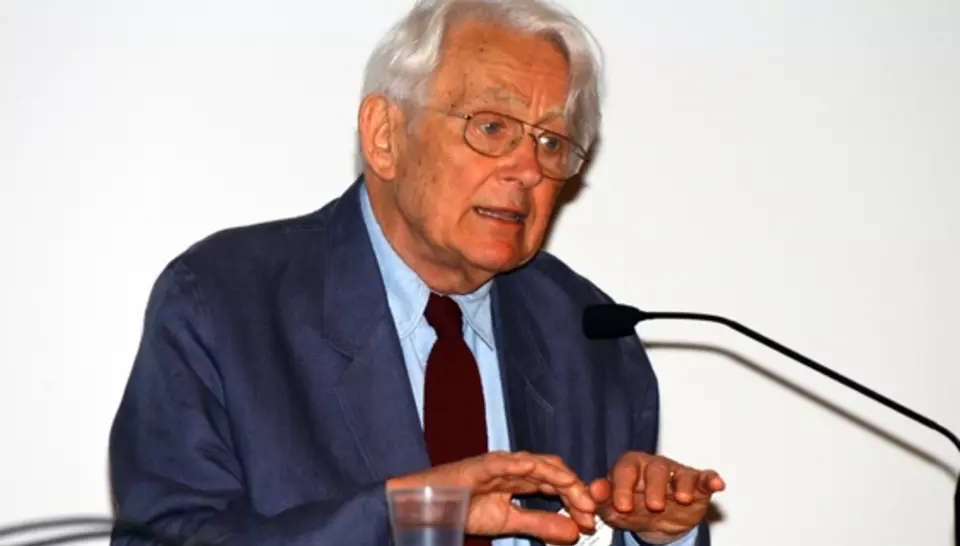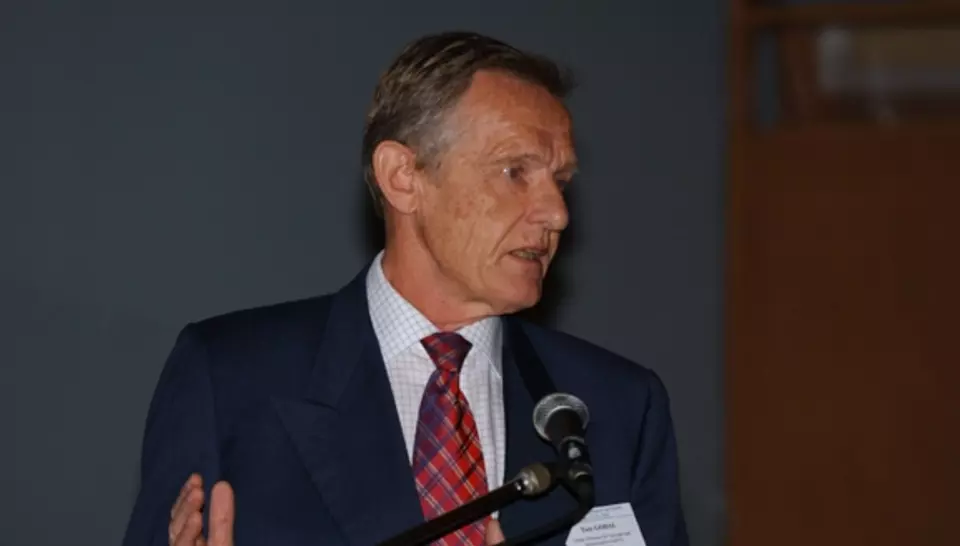June 17-18, 2004
Institut Pasteur, Paris
Health and environment
Improving the environment appears to be a key to the health of populations. Appropriate educational endeavors bring optimal effect, playing a determining role in development. At the Johannesburg Summit in 2002, the fundamental link between access to essential services, like drinking water, waste disposal and health, lay at the heart of the discussions on sustainable development. In this context the Institut Veolia Environnement in association with the Institut Pasteur organized in June 2004 a conference on the theme «Education, Environment and Health» which brought together 24 international specialists to identify priorities and propose a program of action.
A coordinated approach combining the environment, health and education could help to avoid serious disorders, and also have very positive effects on economy.
24 international speakers
360 participants
2 days of interventions
The 24 international speakers
Hélène AHRWEILER, President, University of Europe
Hélène Ahrweiler has a doctorate degree in history and classics. She has been a professor at the Sorbonne, Faculty of Arts in Paris, since 1967. She was vice-chancellor of the University of Paris I (1976-1981) then rector of the Académie de Paris (1982-1989) and Vice-president of the French National Education Council (1983-1989). She is also a former President of the Maison des Sciences de l’Homme (1982-1989) and the Centre Georges Pompidou (1989-1991). At the moment she is President of the University of Europe, a corresponding fellow of the British Academy, the Athens Academy and the Berlin and Bulgarian Academies of Science, and an associate member of the Belgian Royal Academy. Hélène Ahrweiler is also a UNESCO social and human sciences expert. Finally, she is the President of the European Cultural Centre at Delphi and of the National Theatre of Greece. She has written many works on Europe and on Byzantium (and is moreover Honorary president of the International Association of Byzantine Studies) and has been awarded honorary doctorates by the universities of London, Harvard, Belgrade, New York, Haïfa, Lima, New Brunswick, by the American University of Paris and by the Athens School of Higher Studies in Political and Social Sciences.
Ken CAPLAN, Director of BPD (Building Partnerships for Development in water and sanitation)
Ken is the Director of BPD, a small, not-for-profit organization that works with and supports responsible partnerships between different sectors to help meet the Millennium Development Goals around water and sanitation. Ken also currently serves as a tutor on the University of Cambridge Cross-Sector Partnership Course. Prior to moving to the UK in 1998, Ken worked in Thailand and Vietnam for 8 years with both donors and NGOs on issues including urban infrastructure, social inclusion, and partnerships around labour standards. Ken holds a Masters degree in International Development and a Bachelor of Science in Foreign Service.
Georges CHARPAK, Physics Nobel Prize, Member of the “Académie des Sciences”
French physicist. Graduate of the Ecole des Mines, Paris. He turned to research when he entered the Centre National de la Recherche Scientifique (CNRS) in 1948. He was also working at the Collège de France (1948- 1955), with Frederic Joliot. In 1959, he joined the CERN in Geneva (European Council for Nuclear Research) where he invented new types of particle detectors, including the multiwire proportional chamber, known as “Charpak’s chamber” (1968) for the real time tracking of elementary particles. The speed, reliability, and processing capacity of the “Charpak chambers” have made it possible to study extremely rare events occurring during interaction between high energy particles. Since 1980, Georges Charpak has been studying applications in biology and medicine of these instruments, in particular for medical imagery. He became a member of the French Science Academy in 1985, and was awarded the Physics Nobel Prize in 1992.
William C CLARK, Harvey Brooks Professor of International Science, Public Policy and Human Development
William C. Clark is the Harvey Brooks Professor of International Science, Public Policy and Human Development at Harvard University's John F. Kennedy School of Government. A biologist by training, he now teaches and does research on science and technology policy for development. He is a member of the US National Academy of Sciences, and a recipient of both the MacArthur Prize and Germany's Humboldt Prize.
William DAB, Director-General, French Ministry of Health
Director-General of the Direction Générale de la Santé and Professor of the “Hygiene and Safety” Chair of the Conservatoire National des Arts et Métiers, William Dab is a physician, ex resident at the Hôpitaux de Paris, holder of a doctorate in Science (Epidemiology). He worked at the Observatoire Régional de Santé d'Ile-de-France. He then taught risk evaluation at the École Nationale de la Santé Publique. He was Deputy Director of the Department of Medical Studies of EDF-GDF, and has represented the Association for the Prevention of Atmospheric Pollution. His personal research has been directed at epidemiological surveillance, the consequences of terrorism, AIDS, and environment-related risks (radiation, geology, air-conditioning, water heating for sanitary uses, quality of inside and outside air). He has authored three books and approximately a hundred scientific publications.
Harvey V. FINEBERG, President, Institute of Medicine, USA
Dean of the Harvard School of Public Health for 13 years, he served as Provost of the University from 1997 to 2000. He is a specialist in decision-making and health policies, and his research interests include the evaluation of vaccines and medical technologies and the development of medical innovations. He is past President of the Society of Medical Decision Making. In addition, as a member of the Institute of Medicine, he has led research in various areas (such as AIDS, medical technologies, and risk in society).
Some works:
- Society's Choices: social and ethical decision making in biomedicine (1995)
- Innovators in Physician Education: the process and pattern of reform in North American medical schools (1995)
- AIDS: prevention through education: a world view (1993)
Tore GODAL, Executive Secretary, GAVI (Global Alliance for Vaccines and Immunization)
A Norwegian-born immunologist, he is former head of the UNDP/World Bank/WHO Special Programme for Research and Training in Tropical Diseases (TDR),and has also served as the initiating project manager for the Roll Back Malaria Project and as special advisor to Grö Harlem Brundtland, Director-General of the World Health Organization. In this discussion with IAVI Report Senior Writer Emily Bass, he describes what GAVI has learned about establishing effective vaccination programs in developing countries and how these lessons could apply more generally to programs that might follow in its footsteps, including the GFATM and future AIDS vaccine distribution schemes.
Paul-Louis GIRARDOT President, Institut Veolia Environnement
After working in water distribution in Morocco from 1958 to 1963, this engineering graduate of the French Ecole Polytechnique and Ecole Nationale des Ponts et Chaussées (ENPC) joined Compagnie Générale des Eaux in 1964, where he stayed for the rest of his career, serving as General Manager from 1981 to 1998. He currently serves as member of the Veolia Environnement Board of Directors.
Velvl W GREENE, Professor Emeritus of Epidemiology and Public Health Ben Gurion University
Dr. Greene was born and educated in Canada, served in the Royal Canadian Army Service Corps, did post-graduate studies at the University of Minnesota, and taught Microbiology, Public Health, and Epidemiology to tens of thousands of university students in Canada, America, and Israel. Though his research career was focused almost entirely on the study and control of Nosocomial infections, he was also one of the early participants in NASA's Exobiology program and was the first director of the Lord Jakobovits Center for Jewish Medical Ethics. He and his wife, Gail, live in Beersheva, Israel.
Pierre-Marc JOHNSON, Former Premier of Quebec, Special advisor on environmental issues
Lawyer and Physician, Former Premier of Quebec, Pierre Marc Johnson trained as both a physician and a lawyer, has distinguished himself above all through his political career (member of cabinet in numerous postings from 1976 to 1985 before becoming Prime Minister of Quebec) and since going back to private life, his involvement in public policy issues related to sustainable development. He is currently Senior Counsel with the law firm of Heenan Blaikie and serves on numerous corporate boards as a Director. He acts in commercial negotiations and the setting up of international partnerships. Former Chairman of the Foreign Policy Committee of the National Round Table on Environment and the Economy in Canada (1990-1997), he regularly publishes articles on the workings of globalisation. He frequently participates in international negotiations on environmental and developmental issues: he was Rapporteur Général of the Bergen Conference (Norway, 1991), special advisor to the Secretary General at the UN Conference on Environment and Development (Rio, 1992), chair of a working group and mediator on financial issues at the Conference of parties for the International Convention to Combat Desertification (UNCCD), 1993-1997, chargé de mission for the UN in Africa in the early implementation stages of the UNCCD; he chairs the TenYear Review Committee of the North American Commission for environmental Cooperation (2003). He has acted as an expert advisor for various G7 and later G8 preparatory meetings dealing with sustainable development issues. He was Council member of the International Union for the Conservation of Nature (IUCN). He lectures in Universities and is an invited speaker to professional, business and NGO gatherings in the Americas and Europe.
Jack T. JONES, School Health Specialist Department of Chronic Diseases and Health Promotion,
Work prior to joining WHO: Mr Jones was employed by the Centres for Disease Control and Prevention (CDC) from 1967-2001. He held two field posts from 1967-73 and worked out of CDC Headquarters from 1974-2001. Work in WHO: Mr Jones was seconded by CDC to WHO in 1991 to promote school health as a viable public health intervention. From 1995-2002, he served as WHO's School Health Team Leader with responsibilities for strengthening the Organization's capacity for school health. During this period, the school health team launched the WHO Information Series on School Health, initiated development of the Global School-based Student Health Survey; developed WHO's Rapid Assessment and Action Planning Process; created networks and alliances for concerted action; and launched county-level capacity building efforts, including nation-wide training programmes to improve school health/HIV prevention efforts in Africa.
Bernard KOUCHNER, Former French Minister of Health
Physician (gastroenterology). He went to Nigeria in May, 1967, shortly after completing his studies. He was resident for the Red Cross and the Secours Médical Français during the conflict in Biafra.. The Nigerian army was slaughtering the civilian population, including the wounded. Unwilling witnesses, doctors were requested not to divulge any information. In the face of such atrocities, silence was unacceptable. At this point, Bernard Kouchner entered the media and public affairs scene. He was the founder of Médecins Sans Frontières in 1971, but left the association in 1979 because of a disagreement. Médecins du Monde was created the following year. From 1988 to 1992, he served as Secretary for Health, and the following year became France’s Minister of Health. He was elected on Michel Rocard’s European list in 1995, so that the “French Doctor” continued to appear on the political scene. As of 1998, combining politics and humanitarian missions, Bernard Kouchner was designated Special Representative to head the United Nations Mission in Kosovo where he served from 1999 to 2001. When he returned to France, he joined the Socialist Party and continued his political activities.
Philippe KOURILSKY, Director-General, Institut Pasteur, Professor at the Collège de France
Biologist, Director-General of Institut Pasteur, Professor at the Collège de France. He is an expert on molecular biology and has been research director at the French National Scientific Research Centre (CNRS) since 1983. He is also Director-General of Institut Pasteur and heads a research unit at the French National Institute of Health and Medical Research (INSERM). Mr Kourilsky was formerly head of research at Pasteur-Mérieux and Connaught (1992-1995). He is also Professor at the Collège de France and a Member of the French Académie des Sciences and of the Academiae Europae.
He has written several books:
- Les Artisans de l'hérédité (The artisans of heredity,1990),
- La science en partage (The lost of science, 1998),
- Du bon usage du principe de précaution (2001), as well as having had more than 300 articles published in international journals (Nature, Cell..).
Koïchiro MATSUURA, Director-General, UNESCO
Born in 1937, Koïchiro Matsuura's early years were formatively influenced by war and its consequences. He grew up in the district of Yamaguchi, just two hours by road from Hiroshima. He studied law at the University of Tokyo and economics at Haverford College (USA) before embarking on a long diplomatic career. He held senior diplomatic posts in Washington DC and Hong Kong before becoming Director General of the Economic Cooperation Bureau and then the North American Affairs Bureau of the Japanese Ministry of Foreign Affairs. He became Deputy Minister of Foreign Affairs, representing Japan in the G-7 Summit sherpa group from 1992 to 1994. He served as Ambassador of Japan to France from 1994 to 1999. Mr Matsuura first became involved with UNESCO as Chairperson of its World Heritage Committee. Subsequently, in November 1999, he was elected the eighth Director General of UNESCO, the first person of Asian origin to hold this post. He has sought to revitalize the Organization's programmes in education, culture, the natural sciences, the social and human sciences, and information and communication. Mr Matsuura has also published many works in the fields of economic cooperation and development, bilateral relations and diplomacy.
Jacqueline MC GLADE, Executive Director, European Environment Agency
Jacqueline McGlade became Executive Director of the European Environment Agency in Copenhagen in 2003; she is on leave from her post as Professor in Environmental Informatics in the Department of Mathematics at University College London. Until 2003, she was a Board member of the Environment Agency of England and Wales with responsibility for Thames Region, navigation and science. Formerly she was Director of the NERC Centre for Coastal and Marine Sciences, Professor of Biological Sciences at Warwick, Director of Theoretical Ecology at the Forschungszentrum Juelich and senior scientist in the federal government of Canada. Her research has focussed on the spatial and non linear dynamics of ecosystems, with particular reference to marine resources, climate change and scenario development. In her non-academic life she is a mother of two daughters, director of a software development company and has written and presented a range of radio and television programmes.
Loïc MONJOUR, President, Eau, Agriculture et Santé en milieu Tropical (EAST)
- MD, Ph D;
- Professor of tropical medicine and public health;
- President of the EAST (Eau, Agriculture et Santé en milieu Tropical);
- Vice – President of the Health commission of the Académie de l'Eau.
Freddy KARUP PEDERSEN, President of Danish Red Cross
- Education: medical doctor 1971 (University of Copenhagen)
- Speciality: paediatrics 1982 (Danish National Board of Health)
- Doctoral thesis: Pneumococcal vaccination, University of Copenhagen 1985
- Head of University Clinic of Paediatrics Copenhagen 1987
- President of Danish Red Cross 1997
- Chairman of the health Commission of the International Federation of Red Cross and Red Crescent Societies 2001
- Member of the standing commission of the International Red Cross 2003
Renaud PIARROUX, Professor of Parasitology and Mycology, University of Franche-Comté
Paediatrician, specialising in infectious and tropical diseases, Doctor of Sciences in microbiology. Professor at the Université de Franche-Comté. He now directs the department of parasitology and mycology of the CHU (teaching hospital) of Besançon. Director of SERF (Research unit for rural health and environment, Université de Franche- Comté). He has particularly studied the transmission of disease working in the INSERM 399 research unit (immunology and genetics of parasitic diseases) in Marseilles and then at SERF. He has also participated in the fighting epidemics in developing countries, (Sub-Saharan Africa, Comores, Middle-East, Central America) in the course of humanitarian missions as Head of Mission with Médecins du Monde and later as epidemics consultant to the association.
Henri PROGLIO, Chairman and CEO, Veolia Environnement
Henri Proglio is a graduate of the HEC business school in Paris. He joined Compagnie Générale des Eaux in 1972 and was appointed President and Chief Executive Officer of CGEA in 1990. He was appointed Executive Vice President of Vivendi Universal and President and Chief Executive Officer of Vivendi Water in 1999. He became Chairman of Veolia Environnement’s Management Board in 2000 then Chairman of the Board of Directors and Chief Executive Officer in April 2003. Henri Proglio is a member and director of the main subsidiaries of the group Veolia, in France and abroad. He is also a member and director of main French companies such as Elior, Casino, Thales, CNES... Today Mr. Proglio chairs the France- China Committee (2004/2005) and is a member of the French National Committee for Sustainable Development.
Mamphela RAMPHELE, Director-General, World Bank (until 2004)
Mamphela Ramphele is one of the four Managing Directors at the World Bank. She oversees the strategic positioning and the operations of the World Bank Institute (WBI) and the Vice-Presidency of External Affairs (EXT). WBI is responsible for the Bank's work on knowledge and capacity enhancement. She is principally involved on matters of knowledge and socio-economic development with major responsibility for the relationship and program implementation of the Development Gateway. In addition, Ms. Ramphele leads the formulation of the Bank's policies on health and education, and is in charge of integrating, monitoring, and evaluating progress with regard to the attainment of the Millennium Development Goals (MDGs). Recently, she led the formulation of the Bank's policy framework on the social dimension of globalisation, including human rights. A South African-born medical doctor, Mamphela Ramphele is also a former Vice-Chancellor of the University of Cape Town. She also holds a Ph.D. in social anthropology, a BCom degree in Administration, and diplomas in Tropical Health & Hygiene and Public Health. She has written many books and articles on education, health, and social development for which she has received numerous prizes and awards.
Paul REITER, Head of the Insect and Infectious Diseases Research Unit - Institut Pasteur
Paul Reiter is a specialist in the biology, ecology, behaviour and control of mosquitoes, and the transmission dynamics and epidemiology of the diseases they transmit. He joined the Institut Pasteur in 2003 after 22 years as a Research Scientist at the US Centres for Disease Control and Prevention (CDC). He is actively involved in the international debate on climate change.
Darren SAYWELL, Programme Manager at the Water Supply and Sanitation Collaborative Council
Dr. Darren Saywell was till recently the Programme Manager at the Water Supply and Sanitation Collaborative Council (WSSCC), an international organization based in Geneva, Switzerland dedicated to accelerating progress towards safe water, sanitation and hygiene for all. A specialist in urban sanitation services, he has ten years of research, training and consultancy experience in the water supply and sanitation sector, working mainly in Africa and South Asia.
Amartya SEN, Nobel Prize for Economics, Lamont University Professor, Harvard University
Amartya Sen is Lamont University Professor and professor of Economics and Philosophy at Harvard University (USA). Previously he was Master of Trinity College, Cambridge (UK). Amartya Sen’s research has ranged over a number of fields in economics, philosophy and decision theory, including social choice theory and welfare economics, for which he was awarded the Nobel Prize in Economics in 1998. He has also worked on development economics, measurement theory and political philosophy. He is past President of the Econometric Society, the Indian Economic Association, the American Economic Association and the International Economic Association. His awards include the Bharat Ratna (the highest honour awarded by the President of India), the Brazilian Ordem do Merito Cientifico (Grã-Cruz), the Presidency of the Italian Republic Medal, the Eisenhower medal, and Honorary Companion of Honour (UK). His publications include: Collective Choice and Social Welfare (1970), Poverty and Famines. An Essay on Entitlement and Deprivation (1981), Inequality Reexamined (1992), Resources, values and development (1997), Development as freedom (2000), Rationality and freedom (2002).
Benoît SILVE, Director-General, Bioforce
Engineer, graduate of the Ecole Navale and of the US Naval War College, Master of Arts (International Relations – University of Salve Regina, RI-USA). After a career as a fighter pilot and commanding officer in the French Navy, (Captain, now retired), in 2003 he joined the Institute “Bioforce Development”, of which he is the Director. He also teaches on the subjects of management, project management, and evaluation. Throughout his career, he has focused on natural resources. On a more personal note, nature has played an important role in his life, and in particular the high altitude mountain setting, generating harmony between man and the environment.





